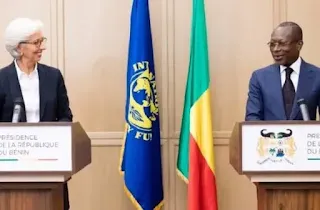The Executive Board of the International Monetary Fund announced on Thursday a new agreement with Benin for a loan amounting to US$200 million over two years, under the Resilience and Recovery Facility. sustainability.
This financing agreement must support the program of the authorities of this West African country aimed at strengthening itsresilience to climate change in particular by integrating climate considerations into policy development, the IMF explained in a press release.
According to the IMF press release, the Executive Board also completed the third review of the 42-month agreement, approved in July 2022, for aid of $638 million to enable Benin to meet its urgent financing needs, to support its development plan focused on achieving the objectives of sustainable development and to further mobilize resources from donors.
This completed review allows the immediate disbursement of 101.58 million SDRs (special drawing rights, an IMF unit of account which is based on a basket of five major international currencies), corresponding to approximately 136 million dollars for the IMF. budget support.
Since the start of the program, the total disbursement has reached 369 million SDRs, or approximately $494 million. The performance of the program remains solid, with all quantitative objectives at end-June 2023 achieved and structural benchmarks implemented, estimated the IMF.
"The resolute implementation of reforms by the authorities is helping to overcome the headwinds linked to the closure of the border with Niger, in a context of regional sanctions against this country, and the gradual elimination of fuel subsidies in Nigeria,” Kenji Okamura, deputy managing director and acting president of the IMF, was quoted as saying in the statement.
"It will be important to remain vigilant in the face of the financial and socio-economic fallout from these shocks to preserve macroeconomic stability", added Mr. Okamura.
Niger: the "content" of the transition "agreed" before ECOWAS opinion
The Togolese Minister of Foreign Affairs in mediation in Niamey affirmed Thursday to have "agreed on the content" and "timing of the transition" in Niger with the Prime Minister of this country led by a military regime since a coup.
The head of Togolese diplomacy, Robert Dussey, said on Nigerien national television Télé Sahel having "worked and agreed on the content and timing of the transition" with "the Prime Minister", Ali Mahaman Lamine Zeine, and "the Minister of Foreign Affairs" Nigeriens, Bakary Yaou Sangaré.
"We will already present to the heads of state mediators and to the ECOWAS Commission (Economic Community of West African States) this content agreed together", he added.
According to Tele Sahel, Mr. Dussey will return to Niamey in January with his counterpart from Sierra Leone, Timothy Kabba. Mr. Kabba was to be present during this mediation, said Mr. Dussey, but"a constraint prevented him from making the trip" in Niamey.
Sunday, ECOWAS meeting at a summit in Abuja opened the way to a reduction of its sanctions against Niger , conditioning it to a "short transition" before a return of civilians to power.
During this summit, it was decided that a committee composed of the presidents of Benin, Togo and Sierra Leone would negotiate with the Nigerien military regime the commitments to be implemented, before a possible relaxation of the sanctions taken by the regional organization shortly after the July 26 coup.
In August, the head of the military regime, General Abdourahamane Tiani, declared that the duration of the transition would not exceed not three years and would be set by "an inclusive national dialogue".
Moreover, ECOWAS declared Thursday that Niger is now "suspended from all decision-making bodies" of the organization, "until the restoration of constitutional order in the country".
It justifies this decision by recognizing that the deposed president Mohamed Bazoum, "whose members of the government were empowered to represent Niger at statutory meetings", was effectively overthrown by a military coup".




Good
ReplyDelete